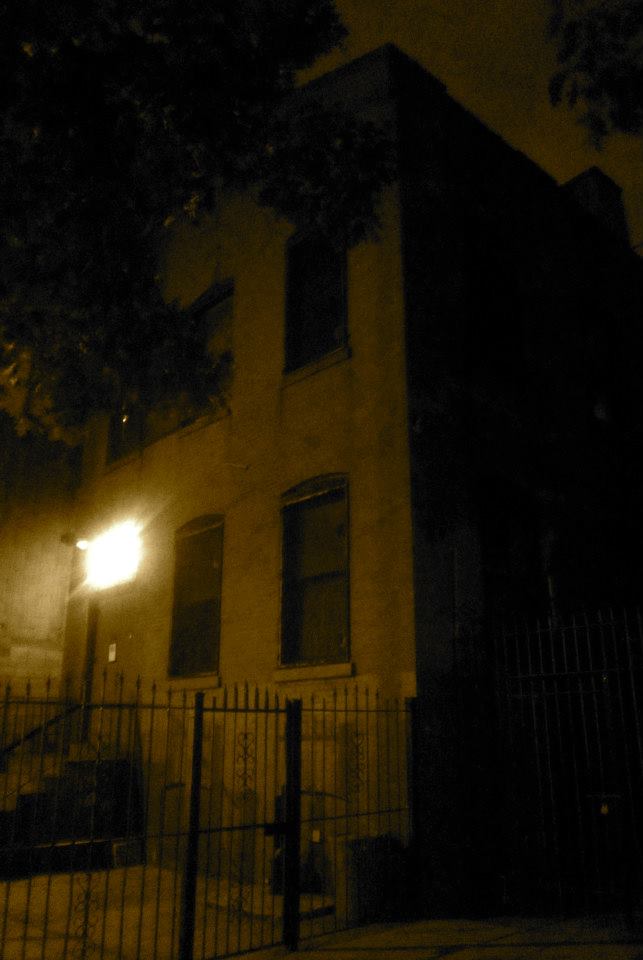I wonder if anyone has called in an anonymous tip about 195 Maujer Street in Williamsburg. The century-old building must be disconcerting to walk past for the uninitiated, not because it is abandoned but because there are signs that it might not be. The blacked-out windows, with wire mesh embedded in the glass, lower overhead, humorless apertures like big toothless mouths. One bare bulb, if you are there at night, illumes the stoop. An air conditioner pokes out from the top floor like the displaced nose on a Picasso portrait. There is a notice on the door that can’t be discerned from the street, except that there is a winged thing inside a circle on the masthead. When the gate to the property isn’t padlocked, the door swings open a couple of times a day and little clusters of people go in or out.
As it happens, on Saturday sometime between 10 and 10:30pm, I was the first one in. Those just behind me were on the young side, and were each carded, which I was not, as admission to Third Rail Projects‘ THEN SHE FELL is age restricted. I suppose I look mine, or close enough. We were pointed by the white-coated man with the clipboard to a room down the hall, where an otherwise taciturn nurse ordered us to deposit our possessions in a file drawer, gave us each a glass of spiced wine (a recipe for which I discovered on an index card in a box that sat on the nurse’s desk) and invited us to look around before directing us to sit in the fifteen chairs arranged against the walls. We are in an asylum, and its chief resident is one Charles Dodgson, aka Lewis Carroll, creator of Alice in Wonderland and doter on Alice Liddell, and it appears that we are in for a treatment. Also for a work of art of a very high order.
The title of THEN SHE FELL’s generic cousin in Manhattan, Sleep No More, has a similar ring to it; although the one is declarative and the other imperative, it is impossible not to associate the two. But while Sleep No More is at heart an intelligent bit of game playing based on Macbeth and the films of Hitchcock, THEN SHE FELL is a long tumble into a troubled psyche that now and then seems to be our own. More than once it is we who are glimpsed in the glass, rather than Carroll or Alice. As we are led, by different routes, through the asylum, asked to take dictation from one or another personage, to sit for tea with the Mad Hatter and watch the Queen of Hearts behead roses from their stalks, offered elixirs to drink and truffles to savor, fingering keys to locks that we may or may not violate, we are treated to (by? with?) moments of great beauty, interactions bequeathing the sublimated reality of one troubled mind to another. All who enter are doubled, twinned, mirrored, and how often in life, one realizes, do we reflect those around us, be it the isolated gesture, the verbal twitch, or the received idea.
The rule at THEN SHE FELL is that one does not speak if not spoken to, which creates its own hall-of-mirrors, for I saw it broken once or twice among the inmates (audience?) before thinking, in an irony that would have delighted Carroll, that it is a rule which, once disobeyed, makes the conversation that follows perfectly legal. But that is game playing, and THEN SHE FELL is deadly serious. I will say little more about it than I have, for it deserves the erased slate of a captive mind, one that, confronted with the reflection, finds it more potent than the thing reflected.
For information on tickets and showtimes, click here.

One response to “Then She Fell”
[…] long ceased to feel experimental: it is everywhere these days. From Sleep No More in Manhattan to Then She Fell in Brooklyn, it retains its edgy feel but has in fact been totally mainstreamed. MURDER BALLAD at […]